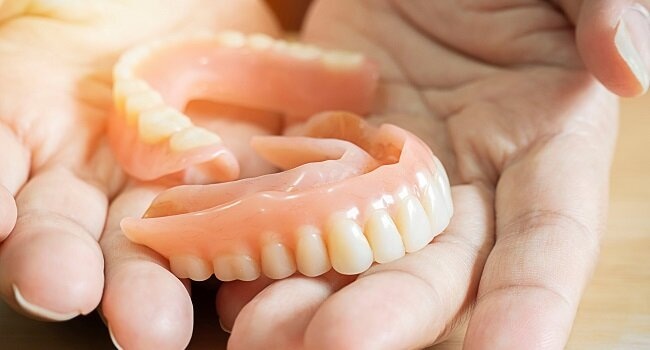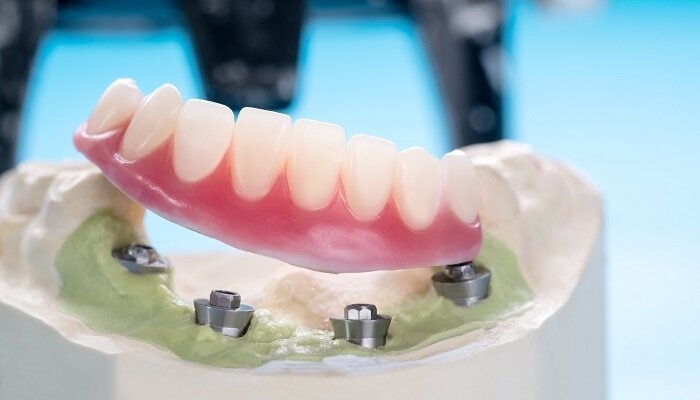Getting your first set of dentures can be a rewarding experience that restores your smile and improves your quality of life. However, with so many available options, deciding which type of dentures is best for you can be overwhelming.
This article explores the different types of dentures available for first-time users, including their advantages and disadvantages. By gaining insight into the options, you can decide the best fit for you.
Different Types of Dentures
Choosing the right set of dentures is a significant decision that requires careful consideration and a discussion with your dentist. Understanding the different tooth replacement solutions, their benefits and drawbacks can help you make an informed decision.
1. Implants or Implant-Retained Dentures
Retained dentures stay in place with the help of additional support mechanisms such as dental implants or natural teeth. One type of retained dentures is fixed or implant-supported dentures, which are permanently fixed to dental implants surgically placed in the jawbone.
The second type is overdentures. Removable dentures fit over the remaining natural teeth or dental implants and are held in place by attachments placed on the remaining teeth or attached to the dental implants.
Advantages
• Both types of retained dentures keep the jaw strong as the implant post replaces the
extracted damaged tooth.
• They help improve the overall denture stability due to the support of dental implants.
• Implant-supported dentures offer a permanent tooth replacement solution.
Disadvantages
• Implant-retained dentures require a surgical procedure, which adds to the overall treatment time and cost.
• They’re unsuitable for individuals with low bone density in the jaw.
Dental implants may not be ideal for patients who’ve lost all their teeth. Consider the next option if you’re too afraid to get dental surgery or want to save time and costs.
2. Conventional Full Dentures
Conventional full dentures are the most preferred type of dentures. This option is suitable when
all of your natural teeth are missing. They consist of a complete set of upper and lower teeth
attached to a removable acrylic or metal base.
Advantages
• They’re among the most affordable options.
• They don’t require surgery or invasive procedures.
• They provide both aesthetic and functional benefits, restoring a person’s smile while allowing them to chew and speak confidently.
Disadvantages
• They’re less stable than retained dentures, leading to potential slippage or discomfort.
• You’ll need denture adhesives to stop them from slipping.
• They may contribute to bone loss in the jaw since these dentures don’t have roots. As a result, the dentures may feel loose and require refitting or replacement.
While conventional full dentures don’t offer a lifelong solution, properly cleaning and maintaining them is necessary to prolong their shelf-life.
3. Partial Dentures
Partial dentures are ideal for people missing a few of their teeth. These dentures consist of replacement teeth attached to a metal or acrylic base that matches a patient’s gum color. Partial dentures are secured to your natural teeth using clasps or precision attachments.
Advantages
• They’re cheaper compared to alternatives like dental implants or bridges.
• They can help restore basic functionality and improve speech.
• They allow for easier cleaning and maintenance of the denture and natural teeth.
Disadvantages
• You may experience initial discomfort until you adjust to wearing the partial denture.
• Patients have an increased potential for gum diseases if oral hygiene practices are not adequately maintained. Partial dentures are convenient to wear but may strain your natural teeth, as partial dentures rely on the latter for support.
4. Immediate Dentures
Immediate dentures are placed in the mouth shortly after extraction to protect your gums during the healing process and to minimize bleeding.
Advantages
• They provide immediate restoration of your chewing and speaking abilities following tooth extraction.
• They protect the extraction sites and promote healing.
• They allow you to maintain your appearance during the recovery period.
Disadvantages
• They may be uncomfortable due to frequent adjustments as the gums and jawbone heal.
• They are a temporary solution until the healing process completes, after which permanent dentures take their place.
Immediate dentures are meant to be worn temporarily and recommended for patients undergoing full mouth extraction.
5. Flexible Dentures
Flexible dentures are made from a flexible, lightweight material like nylon. They are a good option for patients who experience allergic reactions or discomfort with traditional acrylic dentures.
Advantages
• Their flexibility provides improved comfort and a natural appearance.
• They are more comfortable to wear as they’re lightweight and less bulky than traditional acrylic dentures.
• They’re better adapted to the mouth’s contours, reducing the risks of sore spots or irritation.
Disadvantages
• They may be more prone to wear and tear over time.
• They have limited design options and color variations compared to traditional dentures.
• They may be more expensive due to the specialized materials and manufacturing processes involved.
Flexible dentures are often more comfortable than conventional ones because they do not have metal clasps. They are lightweight and will not break if you drop them, making them a suitable option for some patients.
Talk To Your Dentist
It is crucial to meet with your dentist to determine the most suitable denture for your needs. Your oral professional will assess your overall oral health, discuss the options, and make appropriate recommendations. They can also answer any questions about the different types of dentures, the process of getting dentures, and how to care for them once you have them.

Working closely with your dentist ensures that you receive personalized care and attention and get the best possible outcome. Remember, proper care and maintenance of your dentures are keys to their longevity and your oral health.



















